10 Best VPN Service Providers In 2024
Are you looking for the best VPN service providers? We’ve got you covered.
Virtual Private Networks (VPN’s) make it easy to encrypt your data and online activity. No matter where you browse the internet from.
A VPN will protect your privacy and give you browsing anonymity. Sounds good right?
In this post, we break down the best VPN providers for businesses and individual users alike.
1. ExpressVPN
ExpressVPN is one of the most popular VPN services that caters to the individual as a way to separate itself from “corporate VPNs” that offer VPN services to large businesses and government entities.

This makes it most suitable for bloggers, entrepreneurs and small businesses with teams of five people or fewer (only a maximum of five simultaneous connections allowed).
ExpressVPN allows you to protect a wide variety of devices. They include computers, smartphones, tablets, internet routers, browsers, video game consoles and smart TV devices.
The service is known for providing some of the fastest speeds and most secure connections to these types of devices, more so than most VPNs out there. It’s able to do that with its massive network of over 3,000 servers operating in over 160 server locations in over 90 countries around the world.
A small handful of these servers operate virtually as a way to deliver even better speeds. The majority of ExpressVPN’s servers are set up so that the physical server and the registered IP address it assigns you temporarily exist in the same country.
When the service tries to connect you to a country that doesn’t have a fast physical server available, it assigns you an IP address from the country you’re trying to connect to but delivers the connection from a nearby physical server that operates more reliably, typically from a nearby country.
These connections occur automatically. The VPN, like all VPNs, identifies the location of the server you’re trying to connect to and assigns you to a server of its own based on what would provide the fastest and most secure connection.
However, ExpressVPN has a tool that allows you to test your speed and choose a different server location if yours appears to be too slow for what you’re trying to do, such as stream video content from Netflix.
Part of ExpressVPN’s infrastructure also includes what’s known as “split tunneling,” an industry term that allows you to connect to services with a local IP address while still accessing the global connections your VPN provides. This is useful for connections that require a local IP address, connecting to LAN devices and saving on bandwidth by only transferring what’s needed through your VPN.
Lastly, ExpressVPN activates a tool called Network Lock automatically when you connect to its network. This tool prevents your IP address and data from being transmitted when you disconnect from the VPN temporarily.
Features:
- 3,000+ servers.
- 160+ server locations in 90+ countries.
- Support for up to five devices.
- Wide range of device types supported.
- Built-in speed test tool with the ability to choose a new location manually.
- Split tunneling feature connects to the VPN and local IP addresses simultaneously.
- A kill switch (“Network Lock”) that keeps your IP address and data encrypted even when you disconnect from the VPN.
- TrustedServer technology ensures data is never written to a server’s hard disk. All data is wiped when the servers are rebooted.
Pricing:
ExpressVPN has three plans that depend on the number of months you want to subscribe to upfront. Pricing starts at $12.95/month, and discounts are offered on the six-month and annual plans.
They offer a 30-day money back guarantee.
2. NordVPN
NordVPN is a super popular VPN service, though this one comes in two versions: one ideal for bloggers and small teams as well as another for larger businesses. The main version, the one that caters to smaller groups, allows you to have up to six simultaneous connections.
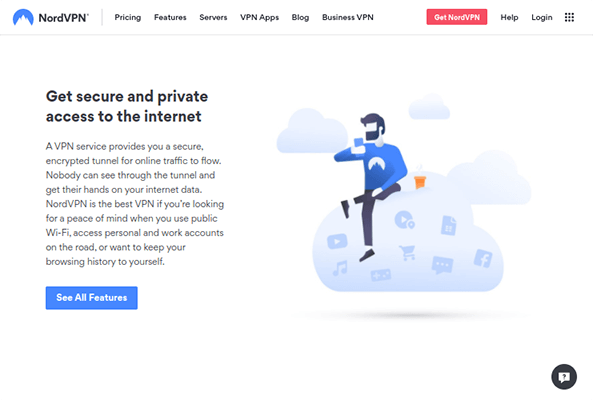
The larger version supports hundreds of users. The drawback is that it uses a much smaller network, though the servers in this network are still high powered. This version is also only available on computer and smartphone operating systems. You’ll also need to contact NordVPN directly to receive a consultation and quote.
We’re going to focus on the main version throughout the remainder of this description.
NordVPN’s network is comprised of over 5,300 servers located in over 50 countries. Double VPN servers are also available if you’d like to encrypt your data across two servers. Dedicated, or private, IP addresses are also available when you need to bypass blacklists or otherwise need to access sites that reject shared IPs.
When it comes to the types of devices NordVPN supports, it supports a smaller collection than what ExpressVPN supports. Computers, smartphones, tablets, browsers, routers and Android TVs are supported, but video game consoles and many smart TVs are not.
Similar to ExpressVPN’s Network Lock, NordVPN has a kill switch that encrypts and protects your data even when you disconnect from the VPN by blocking your device from accessing the internet.
NordVPN also has a feature called Onion Over VPN. This feature allows you to browse the internet through the Tor browser and hide your activity from your internet service provider.
As an extra layer of security for major operating systems, NordVPN offers CyberSec, a tool that blocks websites known for delivering malware and phishing scams. It can even pick up on and block intrusive ads.
Features:
- 5,300+ servers located in over 50 countries.
- Support for up to six devices.
- Business VPN available for large businesses.
- Major operating systems supported.
- Kill switch that keeps your data encrypted when you disconnect from the VPN.
- Double encrypted provided by securing your data on two VPN servers.
- Dedicated IP address allows you to bypass blacklists and blocks for shared IPs.
Pricing:
NordVPN offers three plans depending on how long you’d like to subscribe for. Monthly plans cost start at $11.99/month. Annual and 2-yearly plans are discounted.
They offer a 30-day money back guarantee.
3. CyberGhost
CyberGhost doesn’t have support for business-level VPN services, and the number of simultaneous connections that are allowed is a maximum of seven, making this VPN most ideal for individuals and small businesses.
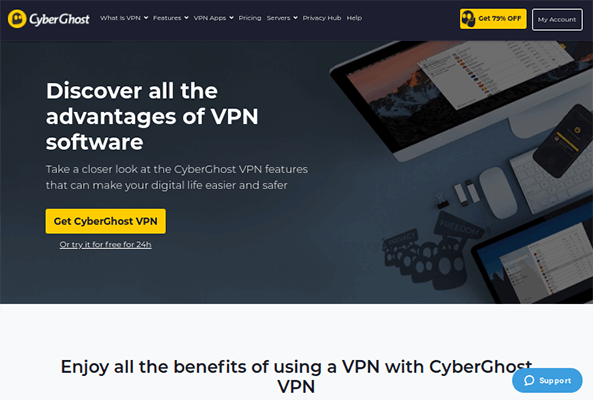
CyberGhost has one of the largest networks of any VPN service with over 6,200 servers located in over 90 countries. Some of these servers are provided virtually.
With such a large and expansive network, CyberGhost is one of the most reliable VPNs you can use in terms of accessing content from restricted areas. It’s also great for those who travel frequently and want to protect their data and access their content from anywhere no matter where they go.
This VPN is also an ideal choice for those concerned with privacy. Its NoSpy servers are designed to hide your activity and data from mass surveillance and third parties interested in stealing your information.
Features:
- 6,200+ servers located in 90+ countries.
- Use VPN on up to seven devices at a time.
- Connect to VPN on an assortment of devices, including older video game consoles like Playstation 3 and Xbox 360.
- NoSpy servers feature deeper encryption to safeguard your activity and data from mass surveillance entities.
- Kill switch keeps your data encrypted as you move in and out of the network.
- Cookie cleaner browser extension lets you clear your cache on the fly, which includes your clearing your browsing history and cached images and files.
Pricing:
CyberGhost’s monthly plans are available at $12.99/month. Discounts are available on six-month and 18-month plans.
They offer a 45-day money back guarantee.
4. Ivacy VPN
Ivacy VPN is another VPN service that splits itself in two: one main version for individuals/small groups and one for businesses. This one offers over 1,000 servers in 100+ locations to business users. Still, you’ll need to contact the service directly to receive a quote for this version.
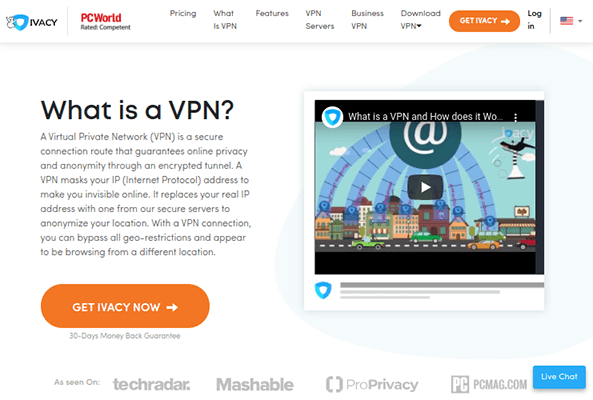
The main version maintains the same number of server locations but ups the number of servers to over 2,000. It also sets itself apart from the previous two options by allowing you to connect up to 10 devices to your account.
You can also use the VPN on a wide assortment of device types, from the general computers, smartphones, tablets and browsers (including Microsoft Edge) to things like routers, smart TV devices and video game consoles.
Features:
- 2,000 servers in 100+ server locations.
- Business VPN available with over 1,000 servers.
- Connect to the VPN on up to 10 devices.
- Wide variety of device types supported.
- Built-in kill switch keeps your data encrypted when your connection to the VPN is interrupted.
- Dedicated IPs available for whitelisting IP addresses.
- Split tunneling available for accessing foreign and local content simultaneously.
- Network-level malware protection included automatically.
Pricing:
Pricing for month-to-month subscriptions start at $9.95/month. You’ll receive discounts when you subscribe to one or two years in advance.
They offer a 30-day money back guarantee.
5. PureVPN
PureVPN is another VPN available in two versions. Its enterprise-level VPN is used by such companies as Apple, Samsung, Sony and SpaceX. This service allows you to connect every member of your company to the network.
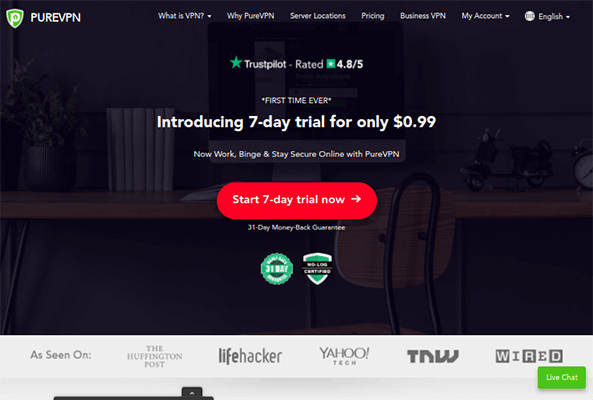
You can even whitelist your IP address to access files and servers within your organization. The VPN can even be used to increase speeds and access to VoIP services like Skype, WhatsApp and VoipConnect.
Dedicated servers and IP addresses are available in over 140 countries as well.
As for the non-business version of PureVPN, its network is made up of over 2,000 servers located 180+ server locations in over 140 countries. Some of these locations even support virtual servers for better speed and connection reliability.
These servers are also designed for streaming video content from services like Netflix and Hulu.
PureVPN’s network also includes a split-tunneling functionality that ensures you can access local files and websites while still encrypting your data from all other websites and third parties through the VPN.
A kill switch is also included to protect your data even when your connection is the VPN is interrupted.
There are also three premium add-ons available for PureVPN. The dedicated IP address add-on is available for an additional $3.99/month while the DDoS protection add-on is $4.99/month.
The port forwarding add-on lets you access your devices from anywhere and can enable faster P2P downloads. This add-on is only $0.99/month.
Features:
- 2,000+ servers.
- 180+ server locations in 140+ countries.
- Use on up to 10 devices at a time.
- Business VPN available for organizations who need more than 10 devices and tools like dedicated servers.
- Use on a variety of devices, including routers, smart TVs and video game consoles.
- Servers are optimized for streaming video.
- Split tunneling available for connecting through local networks and the VPN at the same time.
- Kill switch keeps you protected.
Pricing:
Monthly plans start at $10.95/month. Discounts are offered on six-month and annual plans. Be weary of the $0.99 seven-day trial. It rolls into an annual plan automatically.
Pricing for PureVPN’s business version varies depending on how many users you need to support, if you want to subscribe monthly or annually, and if you need a dedicated IP and server.
Nevertheless, pricing starts at $42.25/month for five user accounts.
They offer a 31-day money back guarantee.
6. PIA (Private Internet Access)
PIA (Private Internet Access) is another trusted VPN provider that takes privacy seriously. They’ve been around for over a decade and have served over 15 million customers to date.
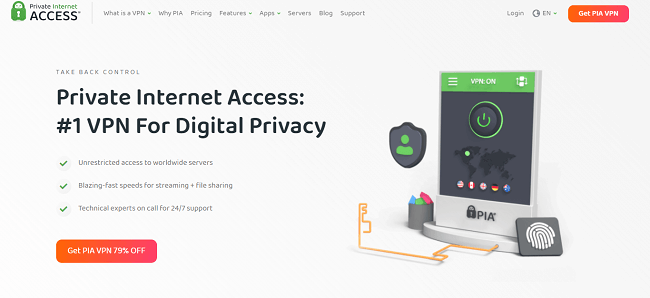
Unlike many other VPN providers, PIA respects its users’ privacy. They have a strict no-logs policy, which means they’ll never store any user data or sell your information to third parties (something which less scrupulous VPN providers are often guilty of).
PIA is also built on open source software for full transparency—anyone can inspect and customize their apps. They use the open-source, state-of-the-art WireGuard protocol to encrypt your data, which is pretty much as good as it gets when it comes to cryptography, so you can be sure you’re well protected.
It’s very easy to use PIA. You don’t need to be a tech whizz to get everything set up the way you want it. All you have to do is choose a plan, download the app, verify your accounts, and you can start browsing securely.
Of course, if you’re not happy with the default settings and know what you’re doing, you can also customize them extensively and configure port forwarding, remote port, proxies, etc.
Private Internet Access also boasts some sophisticated features that you don’t often find elsewhere, like advanced split-tunneling, configurable automation rules (allowing you to auto-connect or auto-disconnect depending on what network you’re on), and more. You can even block ads, trackers, and malware with the innovative MACE feature at the DNS level.
On top of all that, PIA also offers blazing-fast speeds, making it a great choice for streaming and file sharing, and an extensive global server network.
Features:
- No logs policy
- 100% open-source
- Easy setup
- Ad, tracker, and malware blocking
- WireGuard protocol
- Unlimited bandwidth
Pricing:
You can sign up for Private Internet Access for $9.95/month. But if you want to get the best deals, it’s best to sign up for a long-term contract. If you sign up for 3 years + 3 months upfront, you’ll pay just $79 per 3 years – a discount of 80%
All plans offer unlimited bandwidth and unrestricted access to PIA’s network of 84 lightning-fast servers in 84 countries on up to 10 different devices, so you can stream and download as much as you like with no data usage caps, plus the free email breach monitor.
You can download the PIA mobile apps and get a 7-day free trial. They also offer a 30-day money-back guarantee on all purchases.
Two premium add-ons are also available: PIA’s antivirus software and a dedicated IP address.
7. Hotspot Shield
Hotspot Shield is another popular VPN provider that claims to be “the world’s fastest VPN”, with connections that are over twice as fast as the competition. These blazing-fast speeds make Hotspot Shield a great choice for streaming and gaming.
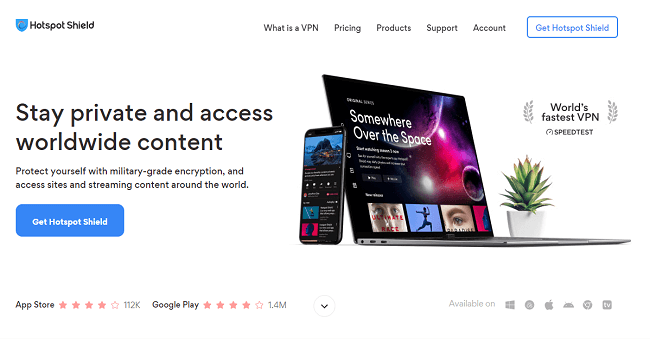
Its claim-to-fame as the world’s fastest VPN has been backed up by Ookla’s Speedtest, which found that Hotspot Shield actually boosts download speed by over 26%, whereas other providers typically decreased speeds by over 42%.
So, why is Hotspot Shield so fast? Well, it probably has something to do with its proprietary Hydra protocol. Unlike other providers that use open-source protocols, Hotspot Shield built Hydra from the ground up to deliver maximum performance.
Its extensive network of over 3,200 servers is spread across 80 countries and 35 cities (115+ total virtual locations), so it’s easy to find an IP address in the location you want to spoof.
While using Hotspot Shield, you can switch on “gaming mode” or “streaming mode” depending on what you’re doing to instantly optimize your server and settings for popular games like Fortnite and VOD services like Netflix or YouTube.
It also offers military-grade encryption and doesn’t keep any logs of your activity for maximum peace of mind.
Aside from all the above, Hotspot Shield also offers one of the most generous free versions and money-back guarantees on the market.
Features:
- Lightning-fast speeds
- Patented Hydra VPN protocol
- Military-grade encryption
- A huge network of servers (3,200)
- Global access (115+ locations)
- Unlimited bandwidth
- 45-day guarantee
- No logs
- Connect up to 5 devices
- One-click configuration (gaming mode/streaming mode)
Pricing:
Hotspot Shield’s basic plan is free but limited to 2Mbps speeds. Usage is capped at 500MB per day and you can also only connect to one device and one virtual location.
There are two paid plans: Premium ($7.99/month) and Premium Family ($11.99/month). Both come with unlimited data limits, 115+ locations, all premium features, and up to 1Gbps speeds.
However, Premium is capped at 1 member account and 5 device connections, whereas Premium Family comes with 5 member accounts and up to 25 device connections.
You can try both paid plans risk-free for 45 days.
8. ProtonVPN
ProtonVPN is a high-speed Swiss VPN built by the same guys behind ProtonMail – the world’s favorite encrypted email service. They believe that privacy and security are basic human rights, and their mission is to break down censorship and build a safer internet.
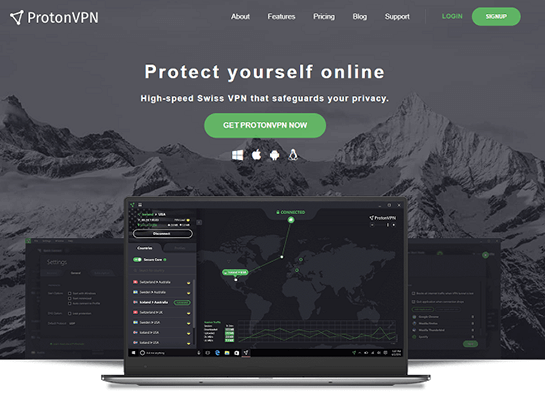
As you’d expect given this background, security is central to ProtonVPN. It was the main focus of the founding team of scientists, who wanted to create a service that could help to keep journalists and activists safe from prying eyes.
It’s headquartered in Switzerland, a country with some of the world’s strongest privacy laws. Switzerland sits outside EU/US jurisdiction and isn’t a member of the fourteen eyes surveillance networks, which means their servers aren’t under surveillance and can’t be compromised.
Aside from that, there are tons of other powerful security features built-in. For example, Perfect Forward Secrecy ciphers prevent encrypted traffic from ever being captured and decrypted, even in the unlikely event that an encryption key is compromised.
The Netshield DNS filter blocks ads and website trackers and protects you from malware while you’re browsing. Plus, ProtonVPN even integrates with Tor so that in one click, you can redirect your traffic through the network.
And of course, they have a strict no-logs policy and won’t track, record, or disclose your internet activity to third parties.
Aside from the robust security, ProtonVPN also offers some of the fastest VPN speeds with a 10GBps server network. ProtonVPN’s unique Accelerator technologies and advanced TCP flow control algorithm work together to provide the best possible performance and stability.
Features:
- Based in Switzerland
- Ciphers with Perfect Forward Secrecy
- NetShield Adblocker
- No logs
- Integrates with Tor anonymity network
- Simplified interface
- Unique VPN Accelerator Technology
- Native apps on multiple platforms
- Global VPN server network
Pricing:
ProtonVPN offers a limited free version with access to 83 servers in 3 countries and medium speeds.
The Basic plan starts from $3.29/month and gives you access to 450+ servers in 40 countries, 2 connections, high speeds, Adblocker, and P2P support.
The Plus plan costs $6.63/month and unlocks the full network of 1600+ global servers, 10 connections, and the highest possible speeds, plus Tor over VPN and other premium features.
The Visionary plan includes all of the above plus a ProtonMail Visionary account.
9. IPVanish
IPVanish is another one of the best VPN providers and offers great value for money.
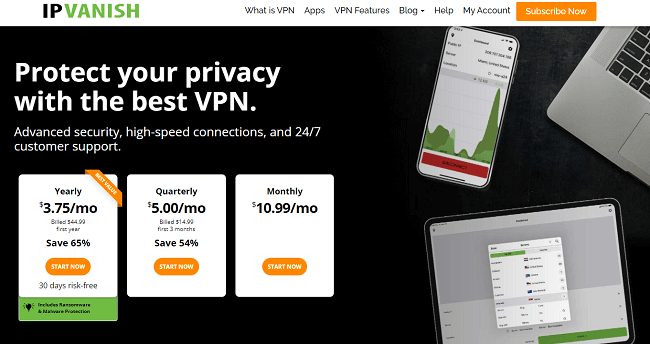
IPVanish uses the same WireGuard protocol as many other VPNs (including PIA), which is widely considered to be the gold standard and enables them to offer top-of-the-line connection speeds.
They maintain a huge network of over 2,000 servers in 75 locations, with over 40,000 shared IP addresses to choose from. No matter where you are, you can access content from pretty much any region on earth with IPVanish.
The ad-free interface is intuitive and easy to use. Setup is quick and easy on any device—mobile, desktop, console, or router—and you can connect as many devices as you want.
Other features worth mentioning are the built-in kill switch to prevent accidental lapses in protection, split tunneling for customizable setups, DNS leak protection, automatic startup loading, and SOCKS5 Proxy.
Features:
- WireGuard protocol
- Multi-platform support
- Unmetered connections
- 2,000+ servers
- 75+ global locations
- 40,000+ shared IP addresses
- No traffic logs
- Kill switch
- Split tunneling
Pricing:
IPVanish offers one standard plan, but you can sign up monthly ($10.99/month) or yearly ($44.99 for the first year then $89.99 every subsequent year).
The yearly plan offers substantial cost savings and includes VIPRE Antivirus for extra protection against ransomware and malware.
Unfortunately, there are no free trials available but if you sign up for the yearly plan, the first 30 days are risk-free.
10. StrongVPN
Next up, we have StrongVPN—another VPN built on the lightning-fast WireGuard protocol.
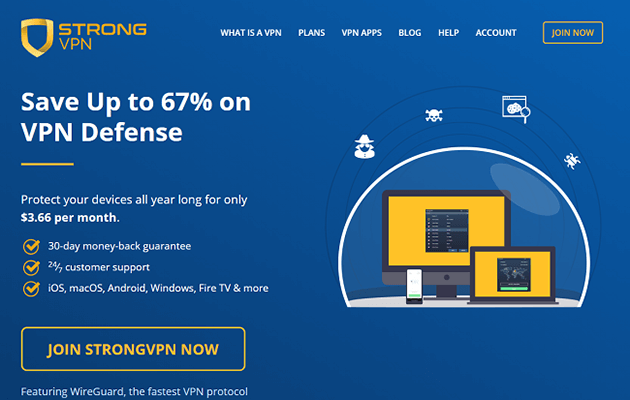
StrongVPN’s server network isn’t quite as large as some of the other providers on this list. However, 950+ servers in 30+ countries should still be more than sufficient for most users.
You can choose a server in the country you want to connect to manually. Alternatively, use the ‘Best Available Location’ setting to have StrongVPN automatically connect you to the closest server to you for maximum speed and performance.
StrongVPN lets you have up to 12 different connections simultaneously, with native apps on Windows, iOS, macOS, Android, and more.
There are no speed limits and no data logging on any plan. There’s also a 30-day money-back guarantee if you’re not happy.
Features:
- WireGuard Protocol
- 950+ servers
- 30+ countries
- 24/7 customer support
- Multi-platform apps (iOS, Mac, Windows, FireTV, etc.)
- High TrustScore
- 30-day money-back guarantee (annual plan only)
- ‘Best available location’ feature
- No logging
Pricing:
You can sign up for StrongVPN on either a monthly or annual plan. The monthly plan costs $10.99/month, while the discount included with the yearly plan means it works out at just $3.66/month for the first year and $79.99/year thereafter.
Both plans come with 250 GB of SugarSync Secure Storage for free, and a 30-day money-back guarantee is available if you sign up for the annual plan.
Frequently asked questions
What is a VPN, and how do they work?
A VPN (Virtual Private Network) is a tool that helps to protect your online privacy by creating an encrypted tunnel for your data. There are various different types of VPNs, but they usually take the form of downloadable software or browser extensions.
When you connect to a VPN on your device while using a public network, it route’s your device’s internet connection through a specially-configured private server run by the VPN provider.
After that, any activity you do online looks as if it’s coming from the VPNs server, rather than your own IP address. This disguises your online identity and encrypts your traffic so that your ISP and other third parties can’t track your online activity, see what websites you visit, or steal your data.
Even if your data is intercepted along the way, it’s completely unreadable. Encryption transforms it into complicated code that nobody can read without the key (a very strong password that can be used to decrypt the code back and into readable information).
It’s also worth noting that most VPN companies have a network of private servers spread all across the world. This allows for something called location spoofing.
You can choose to route your connection through a server in a specific country in order to make your connection appear like it’s coming from within that country, thus allowing you to access geo-locked content.
What to look for in a VPN provider
There are lots of different factors to look out for when choosing the best VPN provider. Here are some of the main ones:
- Performance & speed. Speed is arguably the most important factor to look for in a VPN. There’s nothing more frustrating than having to wait forever for videos to buffer and pages to load when connected to your VPN, so make sure you choose a high-performance provider.
- Server locations. One of the main reasons people use VPNs is to spoof their location and access geo-locked content (such as US-only Netflix shows). Look for a VPN provider with servers in the location you plan on spoofing from most often.
- Bandwidth. Free VPNs often limit bandwidth to 10GB or less. You’ll eat that up quickly if you plan on streaming video online, so it’s also worth choosing a VPN provider that offers unlimited bandwidth.
- Device compatibility. If you plan on using a VPN on multiple devices, make sure you choose a plan that’s suitable. Some virtual private networks can be used on any device, from smartphones and tablets to desktops and even game consoles.
- Encryption protocols. Different VPN providers use different methods to secure and encrypt data. Look carefully at this when choosing a provider as it’ll have a big impact on your security. The AES (Advanced Encryption Standard) is widely considered to be the gold standard.
- Kill switch. This is another essential security feature. A kill switch cuts your internet connection if your VPN stops working to ensure your privacy and security aren’t compromised. Only use virtual private networks that offer this feature.
- No logs guarantee. Virtual private networks prevent your ISP from tracking, storing, and selling data on your web browsing habits to third parties. However, unless your VPN provider offers a no logs guarantee, they could track your online activity and sell it themselves. This is often the case with ‘free’ VPNs. Therefore, make sure you choose a VPN provider that respects your right to anonymity and offers a no logs guarantee.
- Dedicated IP. Typically, when you connect to a VPN server, you share the IP address with tons of other VPN users. However, some VPN services provide you with a dedicated static IP address that only you can use, which improves performance and security. Just be aware that dedicated IP plans typically cost more than regular VPN services.
Why do I need a VPN provider?
Everyone can benefit from a VPN. Your data is valuable, and in the modern digital age, it’s more important to protect that data than ever.
Whenever you connect to public WiFi networks, such as at the coffee shop or airport, somebody can track your data. They can see what you do online, what websites you visit, and build up a profile of you that can then be sold to advertisers, governments, and other third parties.
Even worse, hackers that gain access to your connection may even be able to steal sensitive data like your banking details and account passwords.
A VPN protects you from these types of privacy and security risks. It encrypts your data and routes it through a private server so that nobody can see who you are or what you’re doing online.
Even at home on your own WiFi connection, your data is at risk. Internet service providers (ISPs) like Sky, BT, Verizon, and AT&T can access your data and see your internet activity. But again, a VPN can stop this.
Aside from these security benefits, there are lots of other reasons you might need a VPN.
For example, if you’re a frequent traveler, a VPN will allow you to spoof your location and continue to connect to the internet from an IP address in your home country, regardless of where you are in the world.
This means you can continue to access geo-locked content like local online news sites and streaming services. If you’re in the UK, but there’s a show you want to watch on Netflix that’s only available to viewers in the US, you can access it by using a VPN.
Location spoofing is especially useful if you’re traveling to a country where internet access is severely restricted, like Russia or China, as it allows you to bypass these restrictions.
Which VPN should I choose?
We only included the best VPN companies when putting together this roundup, so you can’t go wrong with any of the options listed above. However, if you can’t pick between them, here’s what we’d recommend:
If you want the overall best and most popular VPN, go for ExpressVPN. It offers some of the fastest speeds and most secure connections on the market, with over 3,000 servers spread over 90 countries. It’s ideal for small businesses, entrepreneurs, and individual users.
I’d also recommend checking out CyberGhost if you want the best set of features. Their NoSpy servers provide deeper encryption, while added features like the cookie cleaner extension enable you to clear your cache and browsing history on the fly.
Final thoughts on VPN providers
Many of these VPN services are incredibly similar, but there are a few ways you can narrow your options down.
First, consider the number of devices you need to connect to the VPN. All of these VPN services have support for enough devices for individual users. However, even a small team can have dozens of devices that need to be connected. In this case, you’ll want to choose a VPN that connects at least 10 devices or offers business services.
You should also consider where you need to access content from and whether or not the VPNs you’re interested in have servers there.
Disclosure: If you buy through links on our site, we may make a commission. This helps to support the running of Startup Bonsai.
